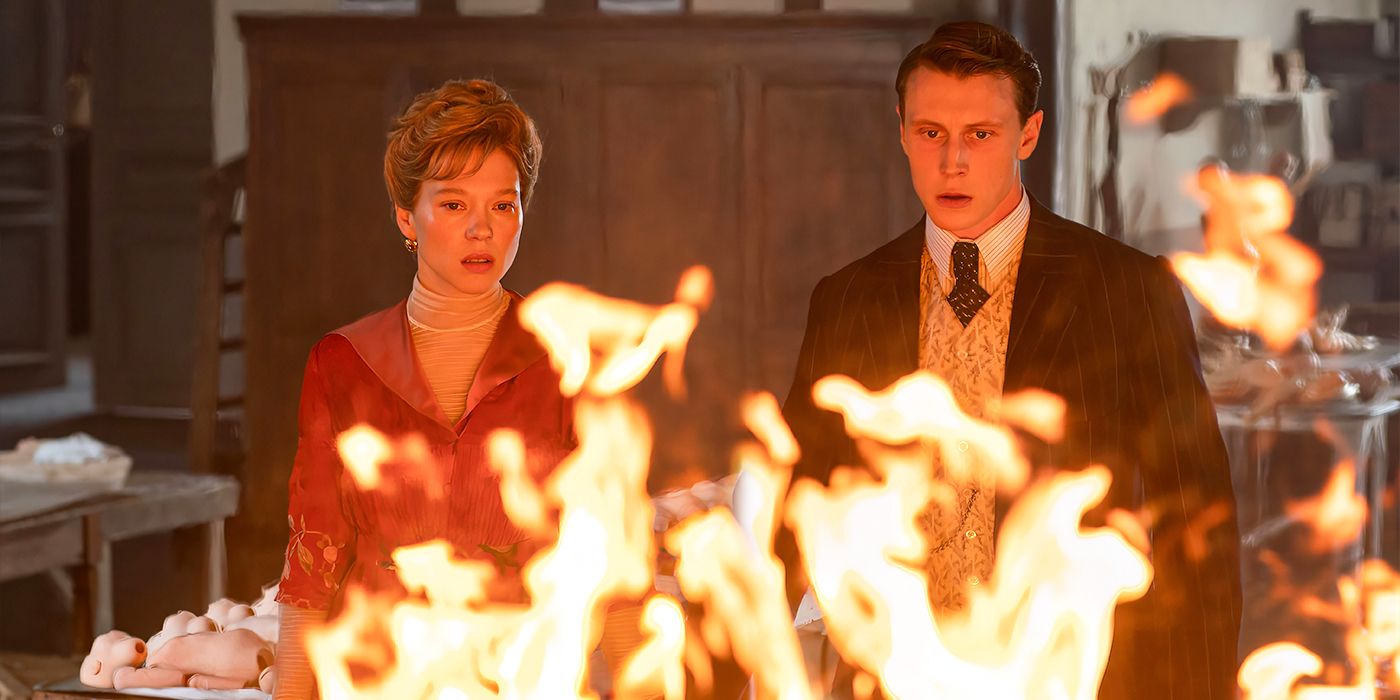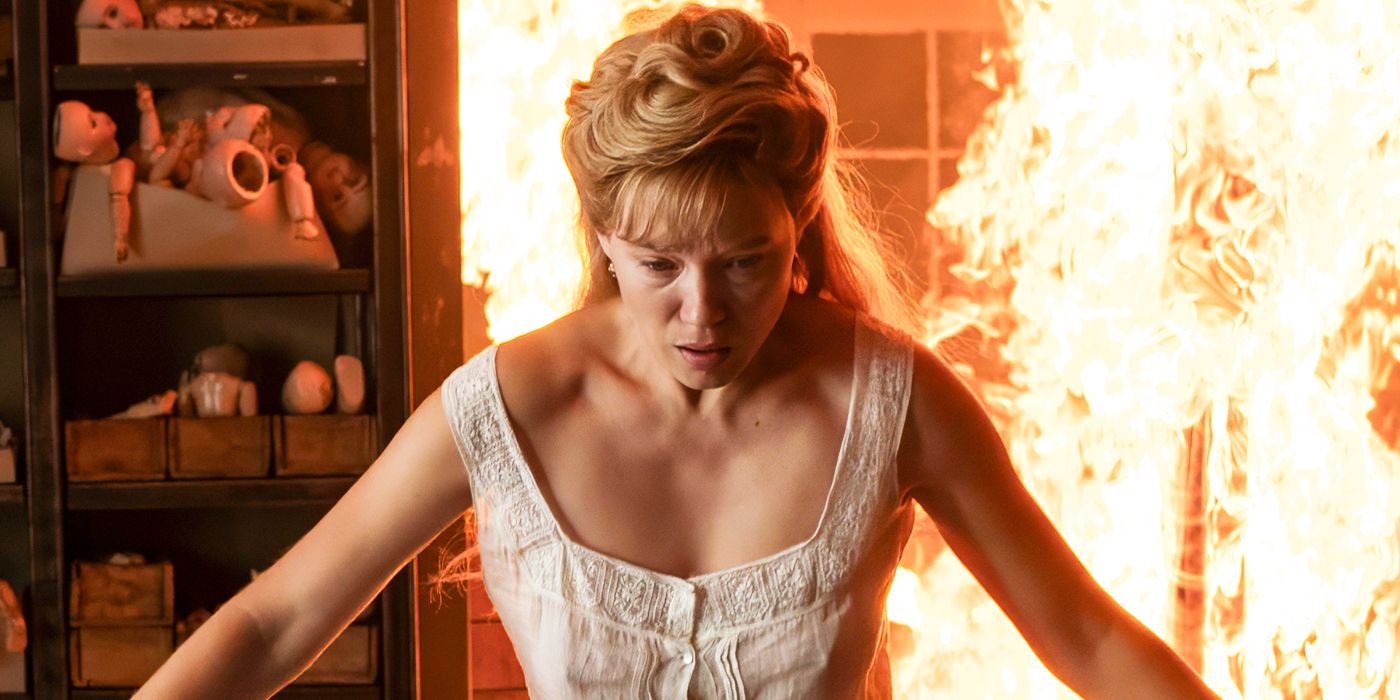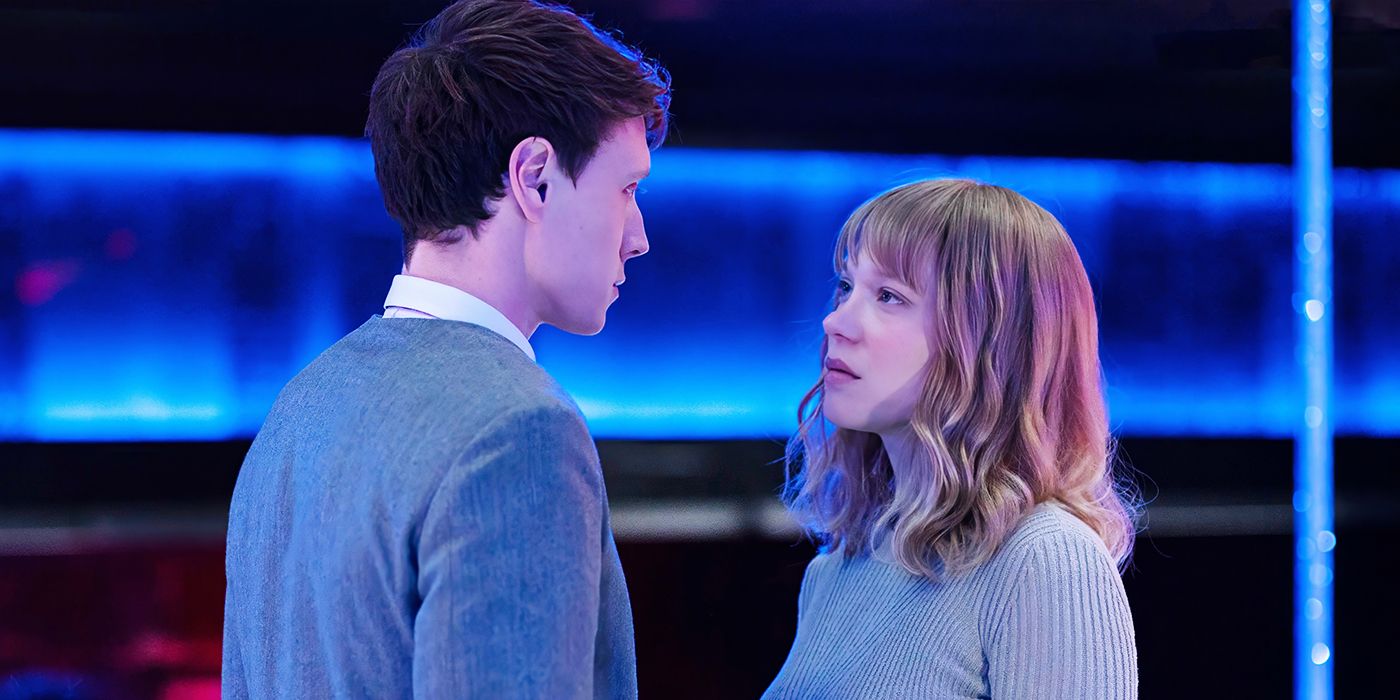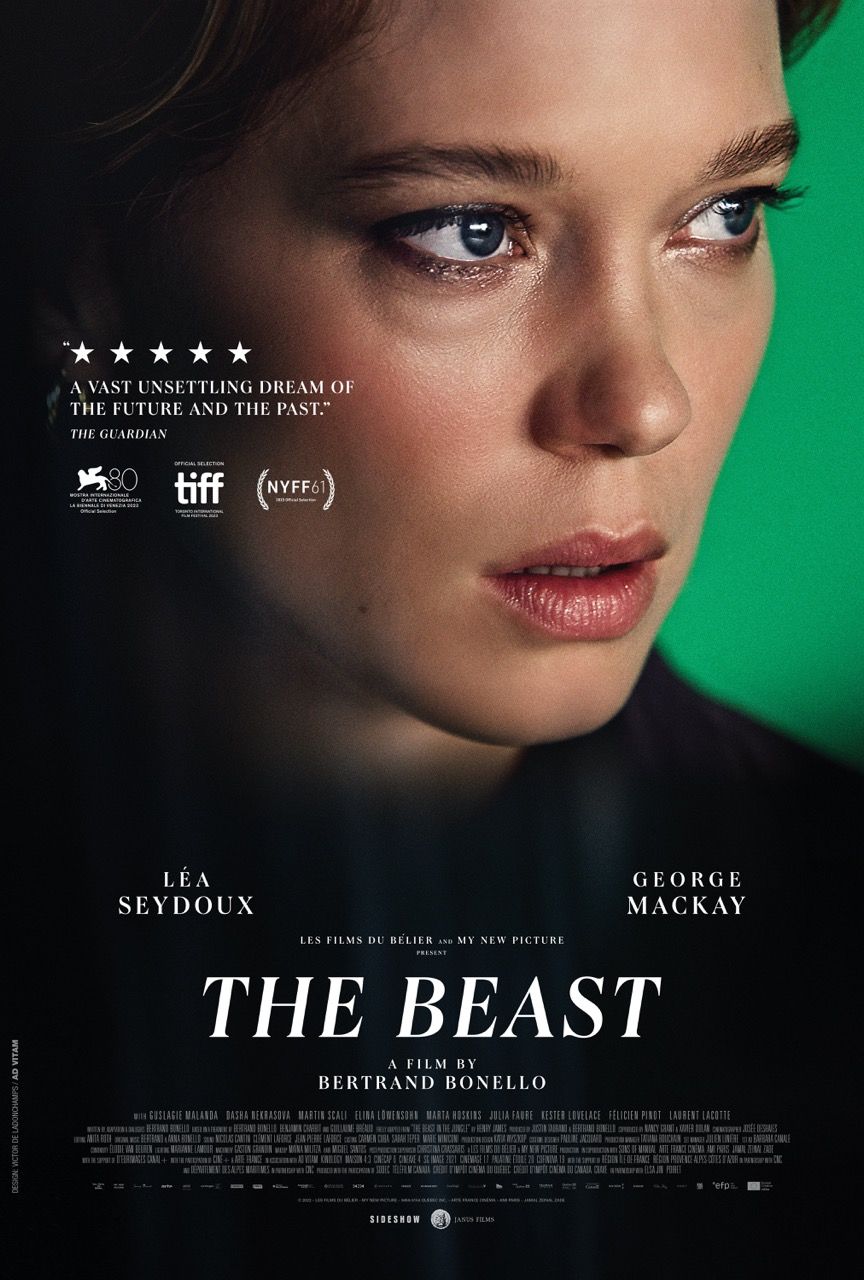Crowning a film as “the best” in a given year is ultimately subjective. However, if there is one 2024 release that decisively earns the title of the most audacious film of the year, it would unequivocally be The Beast. The film by French visionary Bertrand Bonello can safely be described as “not for everyone.” It’s an acquired taste, but for anyone who connects with this year’s critical darling, it will linger in your mind for the rest of the year as you try to unpack its thematic complexities and creative grandeur. Simply put, Bonello’s film is something you have to see to believe, as its elevator pitch is guaranteed to make one’s head spin. To best encapsulate The Beast, it is a perverse costume drama, psychological horror film, and dystopian time-traveling odyssey all rolled into one.
Bertrand Bonello Taps Into the Suppressed Demons of Humanity in His Films
The year is 2044, a not-so-distant future when emotions are perceived as a threat to humanity. Artificial intelligence controls the fabric of society. One woman, Gabrielle (Léa Seydoux), is frustrated with her lowly job reading the temperature of data cores. To compete with the machines dominating the workforce, she finally decides to purify her DNA through a device that will immerse her into her previous lives across dimensions and rid her of any passionate feelings. During her first operation, Gabrielle is transported to 1910 Paris, where she is married into fashionable society as an acclaimed pianist and dollmaking entrepreneur. She encounters a man, Louis (George MacKay), and begins a forbidden romance with him. In her second stage of the DNA cleansing operation, Gabrielle is sent to 2014 Los Angeles, where she is an actress and model. Louis, rather than finding love, is a rage-filled incel, deadset on enacting revenge on women for breaking his heart.

Related
You Can Watch One of the Best Sci-Fi Movies Ever Made for Free Right Now
Sometimes, the most challenging sci-fi is the best.
The Beast, based on the Henry James novella, The Beast in the Jungle, is as sweeping as it sounds. Bonello’s juggling act is not always seamless, and the imperfections in the narrative consistency of the film speak to themes of fleeting memories and emotions. What is most striking about the film is that Bonello’s direction is austere and calculated in its tone despite examining the messiness of emotional longing and regret. Bonello, the writer-director behind the brothel-set drama House of Tolerance and the domestic terrorism thriller Nocturama, has never shied away from audience provocation. He taps into the suppressed demons that lie within everyday society, and he deploys salacious material to reflect on the decay of our modern world.
The 2014 Los Angeles vignette, featuring Louis recording a series of video diaries sharing his deep-seated frustrations with his virginity and alienation from women, is pulled from the video confessionals and manifesto of Elliot Rodger, who, in 2014, went on a murdering rampage motivated by incel beliefs. Awaiting Gabrielle and Louis in France is the fatalistic threat of the 1910 Great Flood of Paris. In both vignettes, Gabrielle and Louis’ attempts at eternal love are compromised by random and unavoidable fatal conclusions, as they are both killed at the end of each segment.
‘The Beast’ Shifts Between Costume Drama, Horror, and Sci-Fi
The synopsis of The Beast, on paper, indicates that fatalism is used gratuitously. By purposefully setting ill-fated love stories amid tragic events, there’s a suggestion that the story will rely too heavily on shock value, which would be exacerbated with the use of a radical incel as a threat to the protagonist. However, Bonello, a striking visual storyteller, captures the milieu of Paris and L.A. in their respective times. The Beast is such an effective genre exercise that it could easily have been committed to being solely a period costume drama or a Lynchian nightmare. Bonello constructs a familiar atmosphere in 1910 Paris: the gilded cage. Gabrielle and Louis are privileged socialites, but they are stricken with a case of eternal longing and a sense of impending doom. Louis implores Gabrielle to capitalize on her urges and express her love for him, even though he is aware of their fatalistic conclusion.
This is where we are reminded that Gabrielle, in the “present day,” is undergoing a DNA cleanse that will wipe away her emotions. While she is captivated by Louis’ elegance and beauty, the concept of romance is too overwhelming. During this vignette, the film is in conversation with Martin Scorsese‘s emotionally repressed costume drama, The Age of Innocence, with one shot of Louis caressing Gabrielle’s hand in a fantasy sequence, being a clear callback to the Edith Wharton adaptation. Humanity’s fascination with the inevitability of death is an evergreen concept. We all know that eternal life is impossible, and people grapple with fatalism in various ways. However, The Beast‘s exploration of rejection and the doomsday complex of these characters parallels the psychological malaise of Generation Z, a group associated with romantic detachment and disillusionment of the future. Because this segment belongs to another lifetime envisioned in Gabrielle’s mind in 2044, we expect a portrait of high-society Paris to be romanticized due to its spiritual, dreamlike nature, but The Beast presents a world where fear is the most overbearing sensation imaginable. To function in life, humans must cleanse their emotionality.
Due to its recency and eerie familiarity, the 2014 L.A. chapter of The Beast is pure nightmare fuel. Once again, this version of Gabrielle, an actress and model, lives in a chic, glossy environment that should be a paradise. Beneath the veneer of Southern California glamor is Gabrielle’s dissatisfaction with her rudderless life. Louis, modeled after the real-life notorious incel murderer, rather than being emotionally repressed, fuels his toxic worldview by stalking Gabrielle and eventually killing her. Bonello shows that the suffocating feelings of fear and rejection carry disastrous complexes in the digital age, where alienated men can inflame their vitriol through video diaries and become empowered through internet subcultures such as the incel community. Despite living in a lavish and sweeping environment in Los Angeles, Gabrielle and Louis are confined to their isolated online worlds. Bonello’s chops as a horror visionary come alive in the 2014 section, as he makes the bombardment of pop-up ads on Gabrielle’s screen while she’s trying to consult a fortune-teller a frightening set piece.
‘The Beast’ Explores the Pain and Trauma of Emotional Longing and the Fears of Love
The Beast is a miraculous achievement of genre blending. Bonello’s direction is not just an exercise in pastiche formalism. He combines the melodrama of a European costume drama and the psychological dread of a horror-thriller film about the digital age to reflect humanity’s temptation for a life without conflict and fear. While the bleak fate of Gabrielle in both lives is set against the backdrop of historical tragedies, they can be interpreted as fatalistic visions inside the mind of someone looking to remove emotions from their mind. In 2014, Gabrielle lived in a mansion overlooking the Los Angeles skyline. She ostensibly belongs to an upper echelon of society, but it is not only the underbelly of society but the underbelly of the Internet, that causes her demise.
Characterizing fear and rejection as monstrous forces in a cataclysmic flooding or a misogynist killer, speaks to Gabrielle’s bleak psychological state. Audiences have seen the portrait of a dystopian future ruled by advanced technology before, but in The Beast, the quiet, empty streets are eerily tranquil. Humans, whose faces are shielded by gas masks, have chosen to rid themselves of emotional pain in favor of stability. The focus on primal human sensations such as regret and everlasting fear makes The Beast a worthwhile watch for anyone, even if they’re averse to gloomy sci-fi epics.
Bertrand Bonello relentlessly throws daunting ideas at his viewers, but despite the bravado of his vision, he provides no concrete solutions in this dystopian sci-fi tale. Following her procedure, Gabrielle finds herself still longing for the unfulfilled romances with Louis in her past lives. The A.I. doctors inform her that she is part of the 0.7% failure rate, leaving her emotions intact. She meets with Louis, who confirms that he witnessed the same past lives as Gabrielle, only that his purification operation was successful. Knowing that she cannot share her romantic longing with him, Gabrielle drops to her knees and screams in anguish. For such a sobering film, a punishing ending is expected, and the conclusion of The Beast teases that Gabrielle lucked out by keeping her emotions alive. However, with the revelation that Louis, the potential love of her life, has been purified, Gabrielle brings the dark side of emotional cognizance to life by screaming on an empty dance floor. With the existential crisis surrounding artificial intelligence prevailing over everyday life, the audience interprets the abolition of emotions as a bleak prophecy. Upon seeing Gabrielle’s climactic breakdown, we naturally begin to reconsider things. Maybe feelings of fear, yearning, and regret are just too much for the human mind and soul to handle.
The Beast is currently available to stream on The Criterion Channel in the U.S.
WATCH ON CRITERION




